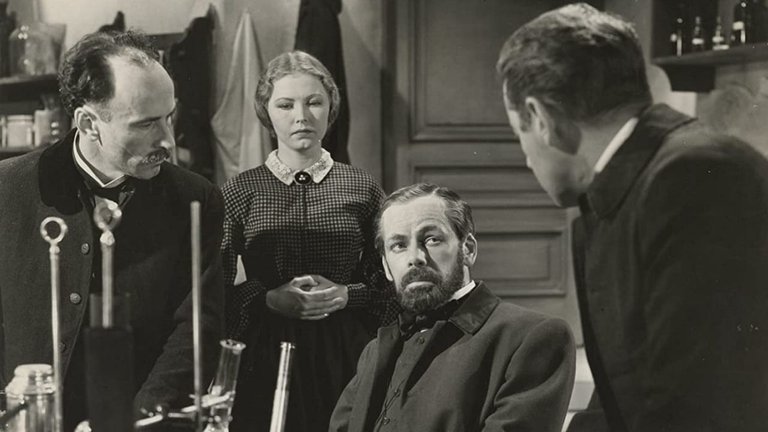Film Review: The Story of Louis Pasteur (1936)

Scientific progress is one of the least appreciated aspects of the modern world. Many things we now take for granted, and without which modern life would be impossible, were not present just a few generations ago. They came about due to the scientific achievements of great people like the protagonist of The Story of Louis Pasteur, a 1936 film directed by William Dieterle, one of the best-known and most successful biopics of Classic Hollywood.
The plot begins in 1860s France, where chemist Louis Pasteur (played by Paul Muni) claims that infectious diseases are caused by microscopic germs and can be prevented, saving countless lives through basic hygiene. This idea seems preposterous to the established scientific community, represented by Dr. Charbonnet (played by Fritz Leiber Sr.), and the government of Emperor Napoleon III (played by Walter Kingsford) becomes hostile toward Pasteur, forcing him to leave Paris. A decade later, France is defeated in war with Prussia, and the new republican government of President Thiers (played by Herbert Corthell) is concerned about anthrax that decimates the country's sheep. The only district that doesn't have such problems is Arbois, and the government sends representatives to discover why. It turns out that Pasteur has worked there, discovered the germ that causes disease, and developed a vaccine. Established scientists are again skeptical, but when Pasteur's spectacular experiment results with vaccinated sheep surviving while those unvaccinated do not, he finally begins to get recognition.
An incident involving a rabid dog biting a man leads Pasteur to start trying to find a vaccine for rabies ("hydrophobia"). His efforts are fruitless until the moment Charbonnet, in an ironic twist, provides him with the idea for a vaccine. After initial experiments with dogs, he makes a difficult decision to test the vaccine on Joseph Meister (played by Dickie Moore), a young boy who has been bitten by a rabid dog.
The Story of Louis Pasteur is, by some authors, named as the first Hollywood biopic. This claim is false, but this film is, on the other hand, the first major Hollywood production to deal with the life of a scientist rather than a more generic (or romantic) historical figure. The script by Pierce Collings and Sheridan Gibney recognizes Pasteur's major scientific achievements, notably his invaluable contribution to the development of germ theory and bacteriology. Science in the film is, however, very simplified, and the plot is made for an audience that has been taught some biology in primary school but hardly anything about it. Interestingly, the achievement that bears Pasteur's name – pasteuriyation – is never mentioned in the film. The script is not historically accurate. For example, Pasteur is portrayed as a maverick rebel opposed by the establishment; in reality, despite having vocal opponents, he worked for the government, and instead of being a single figure, he led a team of talented scientists.
Lack of proper drama is compensated for with a fictional romantic subplot involving Pasteur's beautiful daughter Annette (played by Anita Louise) and Jean Martel, a dashing young doctor (played by Donald Woods), as well as a finale that drowns in cheap melodrama.
Jack Warner, head of Warner Bros. studio, was initially skeptical about the film about a scientist, and The Story of Louis Pasteur had a relatively low budget. However, superb direction by German director William Dieterle made this film look grander than it actually was. Paul Muni, the actor known for taking his work seriously, used this opportunity to play the wise, saintly, and almost martyr-like character, different from the violent gangster in Scarface (1932). His work, which easily overshadows everything else, was rightfully awarded with an Oscar for Best Actor, and the film itself won two more – for original screenplay and the story. The results at the box office were also impressive, leading initially Jack Warner to invest a much larger sum in The Life of Emile Zola, another biopic starring Paul Muni and directed by Dieterle, which would become another triumph.
RATING: 6/10 (++)
Blog in Croatian https://draxblog.com
Blog in English https://draxreview.wordpress.com/
Leofinance blog https://leofinance.io/@drax.leo
Unstoppable Domains: https://unstoppabledomains.com/?ref=3fc23fc42c1b417
Hiveonboard: https://hiveonboard.com?ref=drax
Bitcoin Lightning HIVE donations: https://v4v.app/v1/lnurlp/qrcode/drax
Rising Star game: https://www.risingstargame.com?referrer=drax
1Inch: https://1inch.exchange/#/r/0x83823d8CCB74F828148258BB4457642124b1328e
BTC donations: 1EWxiMiP6iiG9rger3NuUSd6HByaxQWafG
ETH donations: 0xB305F144323b99e6f8b1d66f5D7DE78B498C32A7
